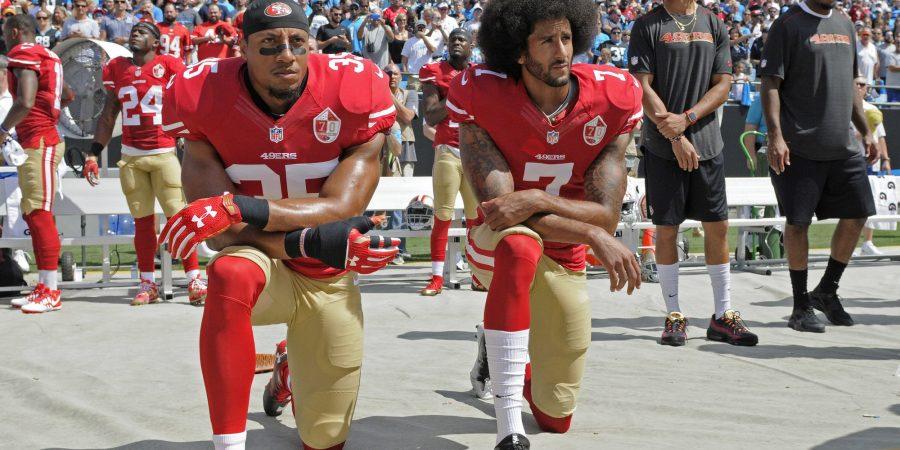Kaepernick Stands Up By Taking A Knee
One of the San Francisco 49ers quarterbacks, Colin Kaepernick recently sat down during the performance of the National Anthem, causing major uproar among fans across the country.
September 26, 2016
The backup quarterback for the San Francisco 49ers Colin Kaepernick, spends most of his time on the sidelines these days. But he’s far from out of the spotlight. After taking a knee during America’s national anthem, Kaepernick has been castigated by many and was recently voted the most disliked player in the NFL.
Kaepernick said he is “not going to stand up to show pride in a flag for a country that oppresses black people and people of color. To me, this is bigger than football and it would be selfish on my part to look the other way. There are bodies in the street and people getting paid leave and are getting away with murder.”
This statement remains the protest’s fundamental goal, as his actions have inspired other NFL, NCAA and high school athletes across the country to kneel during the Star Spangled Banner.
Numerous critics have attacked Kaepernick, saying the act of kneeling during the anthem is disrespectful to the NFL, the military, the veterans and the United States as a whole. Some claim he is trying to gain attention so he can get more playing time. Others call for him to be suspended or expelled from the NFL because it is an inappropriate venue to protest. But regardless of personal views on Kaepernick’s decision to kneel, he has changed the game.
CAS sophomore Larenz Brown offered his two cents on the matter.
“What people don’t realize about this situation is that he’s not solving a problem,” Brown said. “He’s undoubtedly started a conversation that needs to be had about the role of police and exactly what it means to be black in America.”
There is no question that a conversation has been created in the midst of national coverage on athletes taking a knee, as President Obama, NFL commissioner Roger Goodell and other iconic figures have spoken out. Whether they support or oppose Kaepernick, former NYU professor N.B.D. Connolly, whose expertise is in the field of race and politics, believes Kaepernick has instigated a moment in time where people are allowed to make similar statements. Connolly referred to the Miami Dolphins’ white chairman Stephen Ross.
“[He] isn’t going to be the first one to protest something like this,” Connolly said. He sees him as a positive influence in the protest, for he has encouraged his players to support the protest and take a stand by doing just the opposite — taking a knee — which Connolly feels this to be vital.
“That to me is the biggest issue … are people really allowed to be vocal in terms of what they believe in?” Connolly said. “Athletes are humans, they’re just like anyone else. They shouldn’t have to keep their political beliefs quiet just because of their position.”
Like Roger Goodell, many critics disagree with Kaepernick’s methods, saying it is an inappropriate platform to protest on. But what other platform does Kaepernick have? He is a professional football player in the NFL, one of the most corrupt organizations in the country. Brown would respond to the critics by asking them examine the problem more critically at its roots.
“It’s a protest, it’s not supposed to be convenient for others.” A country like ours — that was founded on protesting — takes pride in the fact people can speak up for what they believe in. So why does everything change when an elite athlete speaks out against racial inequality?
In the past three years, the NFL suspended Ray Rice for two games after there was video evidence of him beating his fiance in an elevator. Later, the NFL suspended Greg Hardy for four games for domestic violence. The organization then went on to suspend Tom Brady for four games for allegedly deflating footballs. After all of the incidents with physical violence and drug abuse, Colin Kaepernick is trying to raise awareness about racial injustices in a country where African-Americans are targeted and senselessly murdered every week. When put into perspective, Kaepernick’s intentions become clearer.
In the heat of recent protests in North Carolina, Oklahoma and elsewhere around the country, Kaepernick is doing something we’ve seen done before: using his platform as a professional athlete to speak out against the inequalities we’ve been witnessing. Regardless of whether one supports or condemns his actions, he is creating a vital conversation that needs to continue in this country.
A version of this article appeared in the Monday, Sept. 26 print edition. Email Brendan Duggan at [email protected].


























































































































































